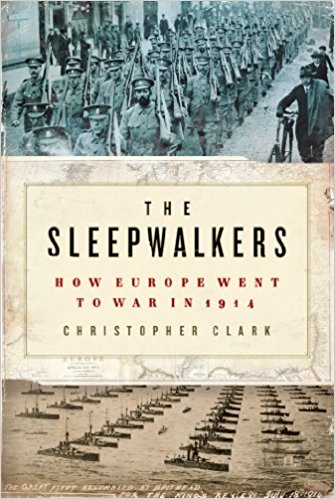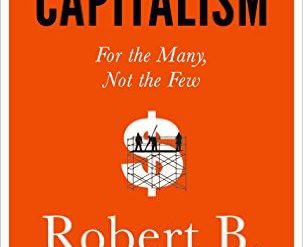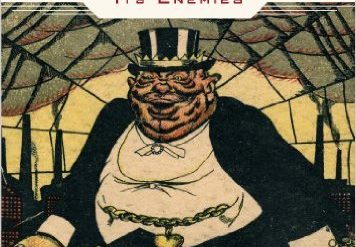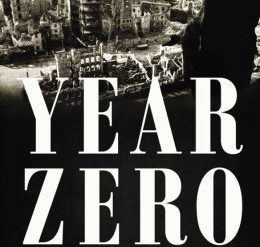
Does history repeat itself? You’d better hope not. Five-year-olds tussling in a sandbox: This is the image that comes to mind of Europe in the summer of 1914 from reading Christopher Clark‘s new inquiry into how the First World War came to be. Naturally, Professor Clark had something much more grown-up in mind when he wrote the book. After all, he is a Fellow at St. Catherine’s College at the University of Cambridge, where he received his Ph.D. in History, and we all know that a Cambridge Don would never indulge in such belittling imagery.
In all fairness, to put the event in proper perspective, “The conflict that began that summer mobilized 65 million troops, claimed three empires [Russian, Ottoman, and Austro-Hungarian], 20 million military and civilian deaths, and 21 million wounded. The horrors of Europe’s twentieth century were born of this catastrophe.”
The Sleepwalkers: How Europe Went to War in 1914 by Christopher Clark (2014) 736 pages ★★★★☆
Does history repeat itself?
With The Sleepwalkers, Clark muscles into the seemingly endless debate about why and how all this came to pass. Not that anybody on the street is talking about this stuff, of course. But among modern European historians these questions pass for excitement, and no wonder: the Great War is generally taken as the climax of the well-ordered Victorian Era that launched the human race with a lurch into the 20th Century.
The origins of the cataclysm that upended tens of millions of lives are variously found in Prussian militarism, the colliding interests of European empires, the arms race, the profit motive among arms merchants, and other cross-border phenomena, but Professor Clark apparently will have none of this. He’s a practitioner of that brand of history that finds truth in the quotidian details of human interaction — in short, in the day-to-day decisions of living, breathing human beings tossed together in a crisis that nobody foresaw.
The polarization of Europe’s geopolitical system was a crucial precondition
In the first of its three parts, The Sleepwalkers thus explores the political environment, highlighting the major players in each of the contending nations — Serbia, Austro-Hungary, Russia, Germany, France, and England — in the years running up to 1914.
Part II takes a broader look at the Continent, discussing the interplay of the leading states in the closing years of the 19th Century and the beginning of the 20th. In outline, the stable alliances of the late 1880s had given way to a bipolar system by 1907, with the Triple Alliance of Germany, Austria-Hungary, and (loosely) Italy facing off against the interlocking fortunes of Russia, France, and Great Britain. Clark asserts that “[t]he polarization of Europe’s geopolitical system was a crucial precondition for the war that broke out in 1914.”
Then, in Part III, Clark delves deeply into the day-by-day, sometimes hour-by-hour, decisions of the leading players from June 28, when Gavrilo Princip shot to death the heir to the Austro-Hungarian throne and his wife, until the early days of August, when all the chips had fallen into place and war was declared on all fronts.
Was the invasion of Iraq comparable to the miscalculations of 1914?
In Clark’s view, “1914 is less remote from us — less illegible — now than it was in the 1980s. Since the end of the Cold War, a system of bipolar stability has made way for a more complex and unpredictable array of forces, including declining empires and rising powers — a state of affairs that invites comparison with the Europe of 1914.” Although Clark makes it easy to see history repeating itself in small ways — for example, the genocidal course pursued by Serbia in the 1990s was little different from its behavior in the decades leading up to 1914 — it’s difficult to see the parallels to most of today’s international crises.
Surely, Professor Clark wouldn’t pretend that the U.S. invasion of Iraq — one of the seminal events of our times and perhaps the greatest strategic blunder in American history — was anything but the result of hubris and colossal miscalculation on the part of an ideology-driven clique within the U.S. government. So, once again, does history repeat itself? We’d better hope not!
Disagreements aside, however, The Sleepwalkers is an outstanding piece of work. Professor Clark’s knowledge of the period he writes about is both broad and deep, and he writes with grace and verve that’s highly unusual in academic circles.
For further reading
This is one of the books I’ve included in my post, Gaining a global perspective on the world around us.
You may enjoy browsing through 20 top nonfiction books about history plus 80 other good books.
If you enjoy reading history in fictional form, check out 20 most enlightening historical novels.
And if you’re looking for a broader view of human history, check out New perspectives on world history.
And you can always find my most popular reviews, and the most recent ones, plus a guide to this whole site, on the Home Page.

























